You'll find powerful natural protection for your signature scents with these five earth-friendly preservatives. Grapefruit seed extract offers broad-spectrum antimicrobial defense, while vitamin E oil guards against oxidation. Essential oil blends of tea tree and lavender create an aromatic preservation system. Rosemary extract provides heat-stable protection, and ferulic acid works synergistically with other antioxidants. Discover how these natural preservatives can transform your perfume's longevity while maintaining its authentic character.
Grapefruit Seed Extract: Nature's Powerful Antimicrobial Guardian
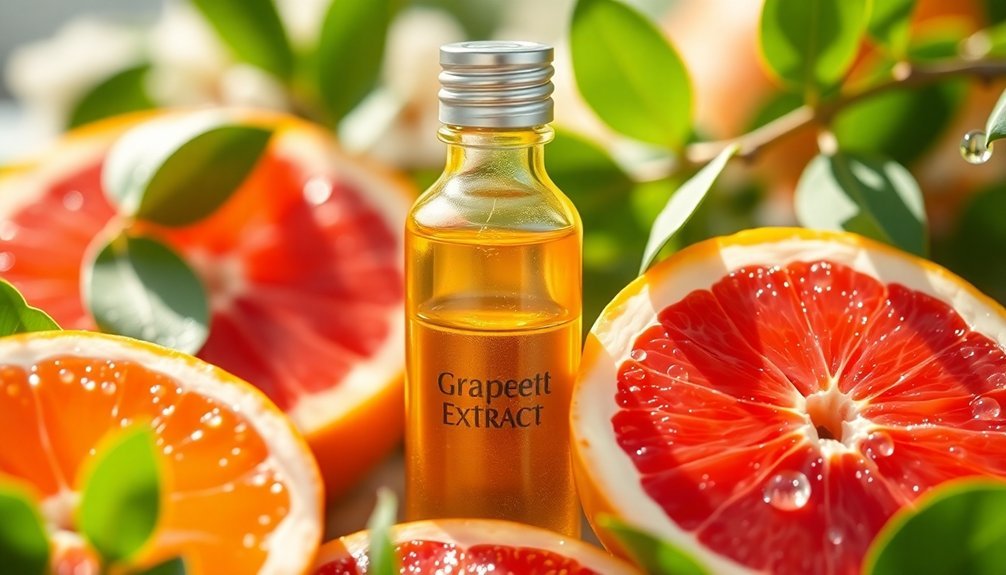
While many synthetic preservatives raise health concerns, grapefruit seed extract (GSE) stands out as nature's formidable antimicrobial agent.
You'll find this powerful extract derived from grapefruit seeds and pulp, naturally rich in flavonoids and vitamins C and E.
What makes GSE exceptional is its broad-spectrum effectiveness against over 800 bacterial and viral strains, plus 100 fungal varieties.
It's particularly valuable for your natural perfumes because it won't interact with other ingredients and works quickly, disrupting harmful microbes within 15 minutes even at dilute concentrations.
When using GSE in your perfume formulations, remember to dilute it properly—it's safe at 1:512 concentration while maintaining its preservative power.
Advanced imaging through scanning transmission electron microscopy has revealed exactly how GSE works by breaking down bacterial cell membranes.
You'll benefit from its natural protective properties without compromising your perfume's integrity or safety profile.
Vitamin E Oil: The Antioxidant Preservation Champion
A powerhouse antioxidant, Vitamin E oil protects your perfumes from oxidation while enhancing their therapeutic value. When you're formulating oil-based perfumes, you'll want to incorporate this golden elixir at 2-30% concentration to extend shelf life and add skin-loving benefits. The natural liquid comes in various sizes from 1 oz to 1 gallon to suit different formulation needs.
| Benefit | Application |
|---|---|
| Oxidation Protection | Guards oils against rancidity |
| Skin Defense | Shields from UV rays and pollutants |
| Therapeutic Value | Supports heart and immune health |
However, don't rely on Vitamin E oil alone as your preservative. It won't protect water-based formulations from mold or bacteria. You'll need a full-spectrum preservative like Optiphen for those. Store your Vitamin E oil-enhanced perfumes in dark, cool places to maintain their potency, as this antioxidant champion degrades when exposed to light and heat.
Essential Oil Preservative Blends: Tea Tree and Lavender Synergy
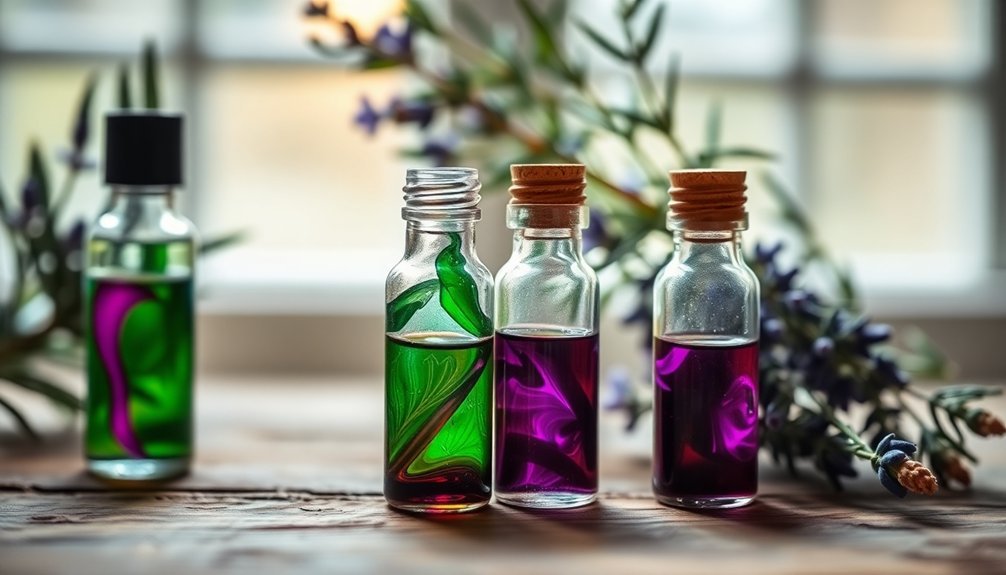
Because Tea Tree and Lavender oils work synergistically, they create one of nature's most effective preservative blends for natural perfumes.
Tea Tree's powerful antimicrobial properties, driven by terpinen-4-ol, pair perfectly with Lavender's antibacterial and antifungal qualities to enhance the overall preservative effect.
You'll find this combination particularly useful because Lavender's pleasant aroma helps balance Tea Tree's medicinal scent. As a versatile essential oil, Lavender adds top and middle notes to your blend.
For the best results, follow a 60/25/15 ratio, using Lavender as your primary oil and Tea Tree as your secondary preservative.
Store your blend in amber glass bottles at temperatures between 5°C and 25°C to maintain its potency.
When you're creating your signature scent, you'll appreciate how this eco-friendly preservative system not only protects your perfume but also adds therapeutic benefits to your formula.
Rosemary Extract: A Time-Tested Natural Defense System
Natural perfumers seeking alternatives to Tea Tree and Lavender often turn to Rosemary Extract, a powerhouse preservative derived from Salvia rosmarinus through CO2 extraction. You'll find its main constituent, Carnosic Acid, delivers superior antioxidant protection that surpasses both Vitamin E and mixed tocopherols.
| Property | Benefit |
|---|---|
| Heat Stability | Remains effective above 200°C |
| Oil Solubility | Blends easily with most carriers |
| Usage Rate | 0.2-0.4% in formulations |
When formulating your perfumes, you'll want to incorporate this extract at 0.2-0.4% concentration for prime preservation. While it's not suitable as a standalone preservative for water-based formulas, it excels at protecting oil-based perfumes. Just remember to keep your formulation's pH below 8.5 and use the product within two months of opening for best results.
Ferulic Acid: Plant-Based Protection From Oxidation
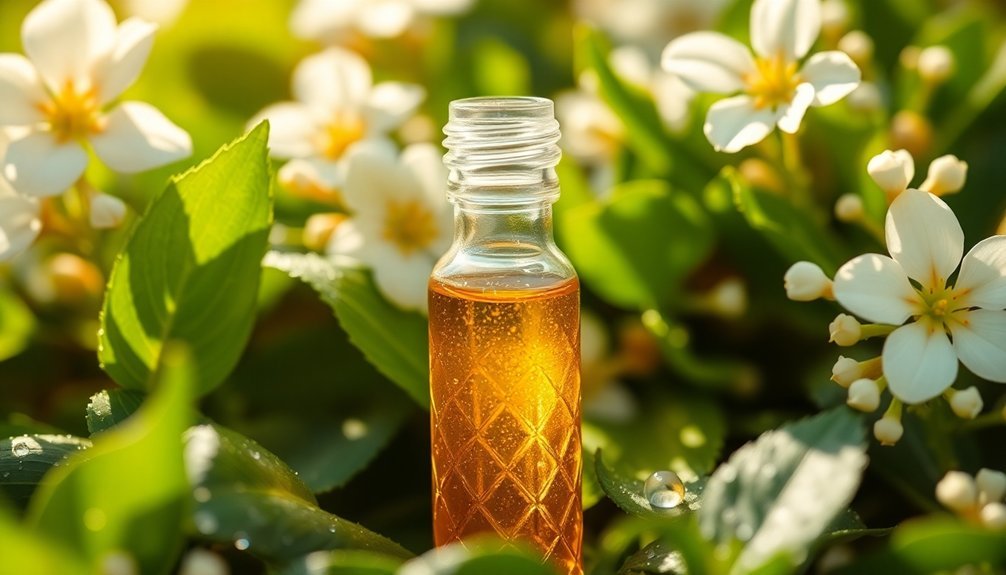
Found within plant cell walls, ferulic acid serves as a powerful antioxidant that you'll want to contemplate for your natural perfume formulations.
This plant-derived compound excels at eliminating harmful free radicals while working synergistically with vitamins C and E to enhance their protective benefits.
When you're formulating with ferulic acid, you'll need to evaluate its stability requirements.
Keep your formulation's pH between 2.5-3.5 and store your products in cool, dark conditions.
You can incorporate it into your perfume's oil phase at concentrations of 0.1-2%.
While it's naturally present in wheat, rice, and various fruits, you'll typically source it as a crystalline powder extracted from rice bran.
Remember that ferulic acid can interact with ascorbic acid, potentially creating new aroma compounds – a factor to evaluate in your perfume composition.
Frequently Asked Questions
How Long Can Natural Preservatives Extend a Perfume's Shelf Life?
You'll get 1-3 years of shelf life with natural preservatives if you're storing properly. They can extend your perfume's life up to 5 years when unopened, but they're not as effective as synthetic preservatives.
Can Natural Preservatives Affect the Original Scent of My Perfume?
Yes, natural preservatives can alter your perfume's original scent. You'll notice they may add subtle notes or modify existing ones. They're also known to interact with essential oils, potentially changing your fragrance's character over time.
What Temperature Should I Store Perfumes With Natural Preservatives?
You should store your perfumes between 10-18°C for ideal preservation. If that's not possible, keep them under 25°C in a cool, dark place away from direct sunlight and heat sources.
Are Natural Preservatives More Expensive Than Synthetic Alternatives?
Yes, you'll typically find natural preservatives are more expensive than synthetic ones. They often require larger quantities to achieve the same effect, and their production costs are higher due to limited availability and harvesting methods.
Can I Mix Different Natural Preservatives Together for Better Protection?
Yes, you can combine natural preservatives with different anti-microbial actions for enhanced protection. You'll want to verify they're compatible and test their effectiveness together through proper preservation challenge testing.
In Summary
You've now discovered five natural preservatives that'll help your signature scents last longer while keeping your commitment to earth-friendly practices. Whether you choose the antimicrobial power of grapefruit seed extract or the antioxidant protection of vitamin E, these preservatives work effectively without synthetic chemicals. Start experimenting with these options today to create perfumes that remain fresh and true to your sustainable values.
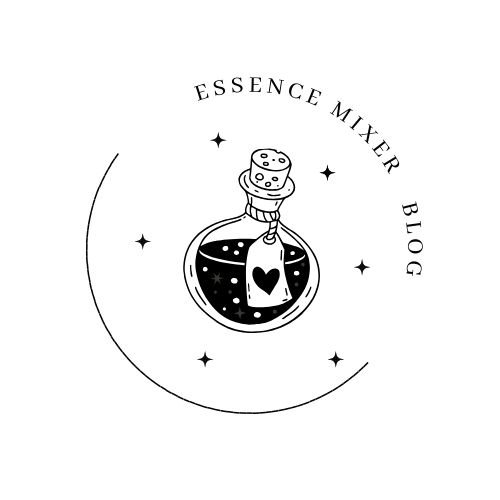
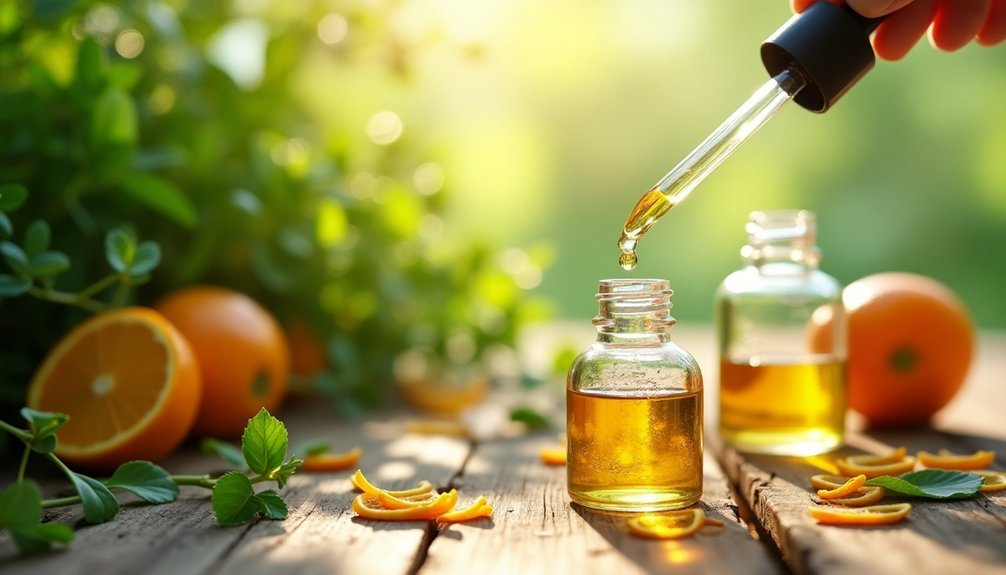


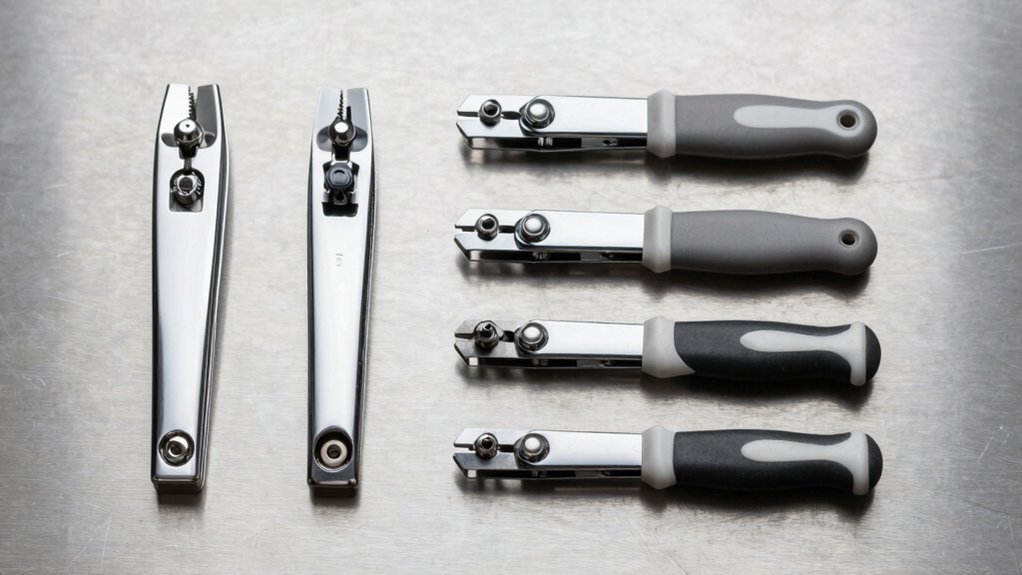
Leave a Reply